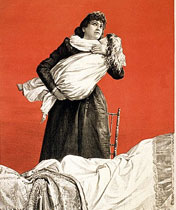
ENGL 623: The Neo-Victorian Novel-- T 6:30 - 9:15
Gloria. Jones – 246
Banc William. Naufftus – 224
Banc
Fall
2005
Fall 2005
x4573,
jonesg@winthrop.edu x4570,
naufftusw@winthrop.edu
Off. Hrs. – M&W 10 –
11 Off. Hrs. –
M 6:15 - 7:15 pm; T 4:00 - 5:00 , 9:15 - 9:45
TR 9:30 - 10:30, by appointment W
11-12, by appointment
Required Texts
Harmon and Holman – A Handbook to Literature
(if you do not already own it) or some comparable volume
Ackroyd, Peter - Chatterton
Byatt, A. S. – Possession: A Romance
Carey, Peter – Jack Maggs
Farrell, J. G. – The Siege of Krishnapur
Fitzgerald, Penelope – The Gate of Angels
Fowles, John – The French Lieutenant’s Woman
Gray, Alasdair – Poor Things
Meyer, Nicholas – The Seven Percent Solution
Toibin, Colm – The Master
Wilson, James – The Dark Clue
Films and Distributed Readings
Rationale
The late twentieth century has seen a remarkable
flowering of interest in what has been called Neo-Victorian fiction. (The
term is necessarily simplistic but is a helpful label.) For the last two
centuries there have been many novels (and short stories and more recently
films) that are set in the past, and many of these have been set in the
nineteenth century, but the Neo-Victorian novel goes beyond this since it
uses some nineteenth century work as intertext: in other words, it "rewrites"
a text, performance, image, or personality from the nineteenth century. There is no significant body of
Neo-Augustan fiction, Neo-Elizabethan drama, or Neo-Homeric epics in
contemporary letters; so the Neo-Victorian phenomenon calls for
explanation. Except for Nicholas Meyers, all of the writers on the syllabus
are serious novelists: The Siege of Krishnapur and Possession: A
Romance have won the Booker Prize, Peter Carey has won the Booker
Prize for two Neo-Victorian novels other than the one on the syllabus; and
Penelope Fitzgerald has both won that prize and been short-listed for it
more often than any other writer. Other writers on our list have won
important but less prestigious awards. When so many serious and
distinguished writers start doing something similar, that something deserves
attention. The oldest novel on our list was published in 1969, the
term Neo-Victorian was coined in the late 1990s, and most of this work is
just beginning to be studied by literary critics. It is not often that we
get an opportunity to do course work on a field that is still being
defined. Our readings will, we hope, be enjoyable in the ways that any good
literature is enjoyable; but we also hope that you will be able to produce
cutting edge written work that will help the field to develop and that this
experience will rewarding.
Goals
- Construct a working definition of postmodernism based on the popularity of neo-Victorian fiction.
- Recognize the motivations that contribute to the frequent rewriting of Victorian literary texts.
- Evaluate the success of varied attempts at rewriting Victorian texts.
- Articulate the Victorian conventions that are being rewritten.
- Identify the main historical outlines of the Victorian period.
- Recognize the importance of a large body of late 20th century fiction and evaluate the connections between the neo-Victorian texts and the 19th century originals that lie behind them.
- Many of the above goals are related to the more general English Department Goals regarding knowledge of literature and critical analysis.
Requirements
- Each student will write a 300 – 500 word essay on 8 of the 10 novels that we read.
- We will have a cumulative final.
- Each student will write one 8-12 page critical paper on one of the novels that we read in class or another approved Neo-Victorian novel. The paper should be carefully researched, clearly written, and suitable for presentation at a scholarly conference. The paper should be written in MLA format.
Attendance
Attendance in this class is very important. Since we are reading a number of novels and additional readings that will be distributed, your attendance and participation will significantly affect your performance. We also expect you to be on time.
Plagiarism Policy
We will not tolerate academic dishonesty. If you do not know how to summarize, paraphrase, or use direct quotes, please refer to the Correct use of Borrowed Information located on the department’s web page http://www.winthrop.edu/english .
If you have additional questions, please ask either of us for guidance.
Late Paper Policy
We will accept late papers, but they will be penalized a letter grade a day. No paper more than two weeks late will be accepted.
Grading
Short Papers
40%
Long Critical Paper
25%
Final Exam
20%
Participation
15%
Return to Neo-Victorian Novel Home Page